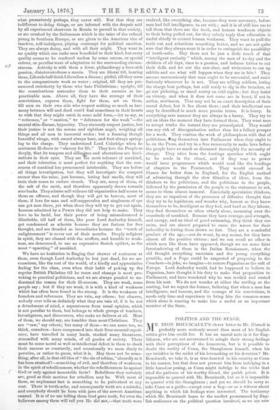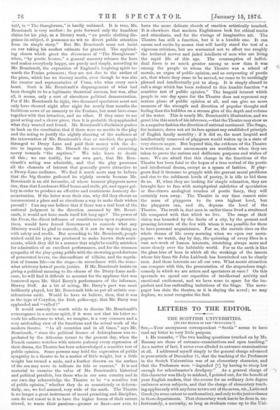POLITICS AND THE STAGE.
MR. DION BOUCICAULT'S clever letter to Mr. Disraeli is probably more seriously meant than most of his English critics give him credit for. It has an unreal note in it for Eng- lishmen, who are not accustomed to mingle their strong feelings with their perceptions of the humorous, but is it possible to doubt the reality of Conn, the Shaugbraun himself, when his eye twinkles in the midst of his lovemaking or his devotion ? Mr. Boucicault, we take it, is as true-hearted to his country as Conn- to his master, but that does not prevent him from indulging in a little harmless posing, as Conn might indulge in the tricks that tried the patience of his worthy friend, the parish priest. It is impossible to quarrel with Mr. Boucicault, but so it is impossible- to quarrel with the Shaughraun ; and yet we should be sorry to - take Conn as a guide—except over a bog—or as a witness about anything in which hib feelings were interested. The testimony- which Mr. Boucicault bears to the verdict pronounced by Eng- lish audiences on the political question involved, as we are now told, in "The Shaughrann," is hardly unbiased. It is true, Mr. Boucicault is very modest; he puts forward only the humblest claims for his play, as a literary work, "no poetic clothing dis- guises its subject, it possesses no wit to divert public attention from its simple story." But Mr. Boucicault must not insist on our taking his modest estimate for granted. The applaud- ing cheers which greet the denouement of "The Shaughraun" when, "by poetic licence," a general amnesty releases the hero and makes everybody happy, are purely and simply, according to Mr. Boucicault, the expression of England's forgiving spirit to- wards the Fenian prisoners ; they are not due to the author of the piece, which has no literary merits, even though he was also the creator and representative of Conn, who wins every one's heart. Such is Mr. Boucicault's disparagement of what had been thought to be a legitimate theatrical success, but was, after all, it seems, only a sort of circuitous political demonstration. For if Dir. Boucicault be right, two thousand spectators must not only have cheered night after night for nearly four months the factitious news of an amnesty to the Fenians, but must have come together with that intention, and no other. If they came to see good acting and a clever piece, then it is probable theyapplauded what they wanted and found. Mr. Boucicault's disclaimer pushes us back on the conclusion that if there were no merits in the play and the acting to justify the nightly cheering of the audience at the intervention of Mr. Boucicault's dens ex machinti, the people thronged to Drury Lane and paid their money with the de- sire to impress upon Mr. Disraeli the necessity of exercising mercy towards "the captives." We take leave to doubt all this ; we can testify, for our own part, that Mr. Bou- cicault's acting was admirable, and that the play possesses all the elements of interest that generally prove attractive to a Drury-Lane audience. We find it much more easy to believe that the big theatre gathered its nightly crowds because Mr. Boucicault is an old favourite, of whose humour playgoers never tire, than that Londoners filled boxes and stalls, pit, and upper gal- lery in order to produce an effective and continuous Amnesty de- monstration. If the latter were their aim, why did they choose so inconvenient a place and so circuitous a way to make their wishes prevail ? Can any one believe that if there was a real bent of the national judgment in the direction assumed by Mr. Bouci- cault, it would not have made itself felt long ago? The power of the Press, the direct influence of constituencies upon representa- tives, would have forced Government to concede what any Ministry would be glad to concede, if it saw its way to doing so with safety and credit. But according to Mr. Boucicault, people waited until his play was produced to make known their senti- ments, which they did in a manner that mightbe readily mistaken for admiration of an excellent performance, and for the common sympathy of the play-going public with the crowning good-fortune of persecuted lovers, the discomfiture of villains, and the regula- tion of human life—on the stage—in accordance with the some- what arbitrary laws of poetic justice. If Mr. Boucicault insists on giving a political meaning to the cheers of the Drury-Lane audi- ence, he will find it difficult to account for the applause that was bestowed upon Mr. Shiel Barry's performance of the informer, Harvey Duff. As a bit of acting, Mr. Barry's part was most brilliantly played, but Mr. Boucicault bids us put all artistic con- siderations aside. Would he have us believe, then, that it was as the type of Corydon, the Irish police-spy, that Mr. Barry was applauded and " called ?"
It would scarcely be worth while to discuss Mr. Boucicault's extravagance in a serious spirit, if it were not that his letter re- veals his adherence to what, we imagine, is a very common and a very misleading view of the functions and the actual work of the modern theatre. "In all countries and in all times," says Mr. Bormicault, "since the political licence of Aristophanes was re- probated by the Athenian tyrant to the present day, when the French censure watches with minute jealousy every expression of their drama, the Theatre has been acknowledged a sensitive test of public opinion. Some persons may hold the expression of public sympathy in a theatre to be a matter of little weight, but a little weight has turned a scale, and a feather thrown on the surface of the sea may serve to indicate its tide or current." It is not material to examine the value of Mr. Boucicault's historical and political parallels, but those who in our own country and in our own day acknowledge the Theatre to be "a sensitive test of public opinion," whether they do so censoriously or deferen- tially, are, we feel assured, very wide of the mark. The Theatre is no longer a great instrument of moral preaching and discipline, men do not resort to it to have the higher forces of their nature stirred, to warm their passions--grosser or finer—nor even to
have the more delicate chords of emotion artistically touched. It is elsewhere that modern Englishmen look for ethical tonics and stimulants, and for the vintage of imaginative art. The Theatre has still a function, but it is a humble one. It can amuse and excite by means that will hardly stand the test of a vigorous criticism, but are warranted not to affect too roughly the irritated nerves and jaded intellects of men who are living the rapid life of this age. The consumption of indivi- dual force is so much greater among us now than it was among the people to whom the Theatre was a school of morals, an organ of public opinion, and an outpouring of poetic art, that where they came to be moved, we come to be soothingly pleased and intellectually put to sleep. It is simply absurd to call a stage which has been reduced to this humble function "a sensitive test of public opinion." The languid interest which people in our day spare for the Theatre does not represent any serious phase of public opinion at all, and can give no more measure of the strength and direction of popular thought and feeling than the bubbles on a stream give of the depth and volume of the water. This is nearly Mr. Boucicault's illustration, and we grant him this much of his inference,—that the Theatre may show us in a negative fashion the direction of national sentiment. The Stage, for instance, dares not set its face against any established principle of English family morality ; if it did so, the most languid and intellectually unmoved of playgoers would waken up in a state of very sincere anger. But beyond this, the evidence of the Theatre is worthless, as most amusements are worthless when they are taken to prove the serious and deliberate purposes and wishes of men. We are afraid that this change in the functions of the Theatre has been fatal to the hopes of a true revival of the poetic and intellectual drama, except as a spasm of fashion. If play- goers find it tiresome to grapple with the gravest moral problems and rise to the sublimest levels of poetry, it is idle to bid them do so. If, when they are looking for simple relaxation, they are brought face to face with metaphysical subtleties of speculation or fine-drawn analogical touches of poetic fancy, they will certainly turn away. The Theatre in our time cannot raise the mass of playgoers to its own highest level, but the playgoers can, and do, depress the level of the Theatre. The truth is, that men in earlier times lived a straitened life compared with that which we live. The range of their vision was bounded by the limits of a city, by the present and pressing interests of the few, with whom it was possible for them to have personal acquaintance. For us, the curtain rises on the whole drama of life every morning when we open our news- papers ; we watch, day by day, the quivering of every fibre in a vast net-work of human interests, stretching always more and more closely over the habitable world. For us the earth is like the glass hive of bees in which all the workings of the insects whose fair fame Sir John Lubbnek has besmirched can be clearly seen. And these interests are all our own. What scenic attraction can compare with this, the presentation of the stupendous tragi- comedy in which we are actors and spectators at once ? On this spectacle we spend our capacities of intellectual activity and emotional excitement, and we have none to spare for the im- perfect and less enthralling imitations of the Stage. The news- paper has slain the theatre, as it is slaying the novel ; we may deplore, we must recognise the fact.



































 Previous page
Previous page